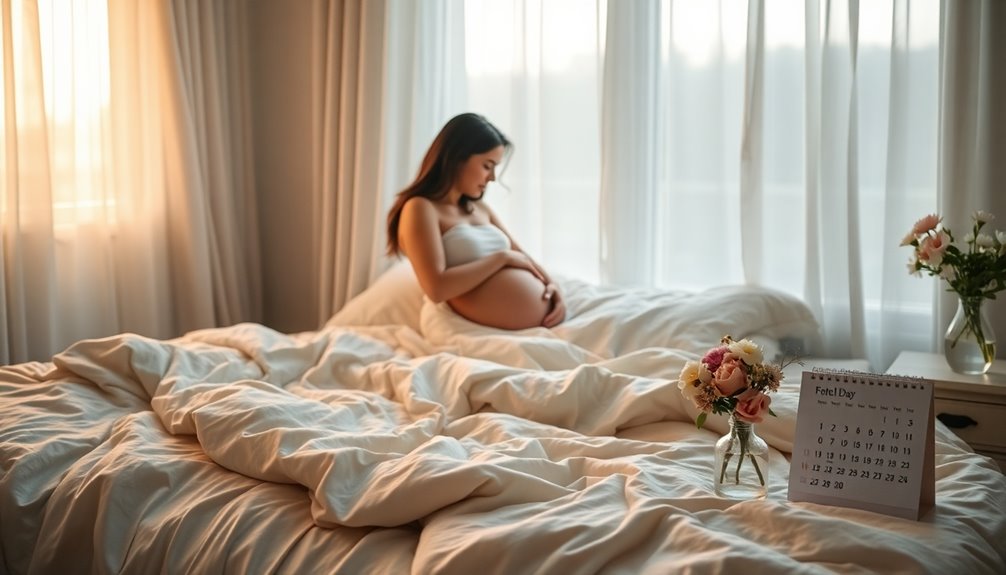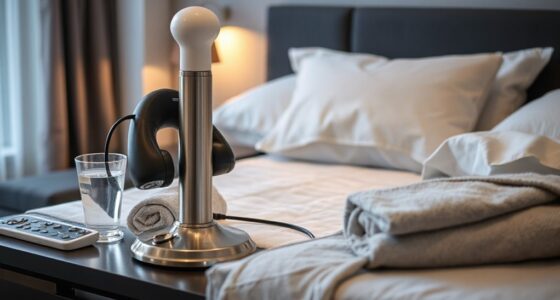The best time of day to have sex for getting pregnant is in the morning, specifically between 6:30 AM and 7:30 AM. During this window, testosterone levels are at their peak, which can enhance sperm production and boost your chances of conception. Additionally, focus on your fertile window, which spans five days before ovulation and the day of ovulation itself. Having intercourse every day or every other day during this time is essential, especially on ovulation day. If you're curious about optimizing your chances even further, there's more useful information waiting for you.
Key Takeaways
- Morning sex between 6:30 AM and 7:30 AM aligns with peak testosterone levels, enhancing sperm vitality.
- Increased libido is often observed in the evening, particularly between 10 PM and 1 AM.
- Aim for daily or every-other-day intercourse during the fertile window, especially on ovulation day.
- Sperm can survive up to five days, making timing before ovulation crucial for conception.
- Monitoring cervical mucus changes can help identify the most fertile days for optimized timing.
Importance of Timing for Conception

When you're trying to conceive, understanding the importance of timing can greatly boost your chances of success.
Focusing on the fertile window, which includes the five days leading up to ovulation and the day itself, is vital. Having intercourse during this period maximizes your likelihood of conception since sperm can survive in the reproductive tract for up to five days.
Tracking ovulation through methods like basal body temperature changes or observing cervical mucus can help you identify the best days.
Studies show that timing can also affect sperm quality; for example, sperm motility and quantity tend to be higher in the late afternoon, while testosterone levels peak in the morning.
Prioritizing timing is essential for enhancing your chances of successful conception.
Best Times of Day

When it comes to timing, morning sex can boost your chances of conception, especially between 6:30 AM and 7:30 AM, when testosterone levels are at their peak.
You might also find that your libido rises in the evening, making that another prime time for intimacy.
Paying attention to these daily rhythms can help you maximize your fertility efforts.
Optimal Morning Timing
Morning intercourse can greatly boost your chances of conception, especially if you aim for the early hours between 6:30 AM and 7:30 AM.
During this time, testosterone levels peak, enhancing sperm quality and viability. Engaging in sex in the morning aligns with your body's natural hormonal fluctuations, which can help optimize timing during your fertile window.
This period spans from five days before ovulation to the day of ovulation, making consistency essential. Morning intimacy not only increases your chances of conception but also helps manage stress levels throughout the day.
Balancing morning sex with comfort at other times can maintain your relationship's intimacy while maximizing your efforts for conception.
Consider making it a regular part of your routine!
Evening Libido Peaks
Evening hours often bring a surge in libido, especially between 10 PM and 1 AM. This time is ideal for intercourse, as you and your partner may feel more relaxed and intimate. While testosterone levels peak in the morning, the emotional connection during the evening can enhance your experience and promote fertility.
| Evening Timing | Benefits |
|---|---|
| 10 PM – 1 AM | Increased libido |
| Relaxation | Better emotional connection |
| Increased intimacy | Heightened enjoyment |
| Sperm motility | Enhanced conception chances |
| Evening calmness | Reduced stress |
Understanding the Menstrual Cycle

To increase your chances of getting pregnant, understanding your menstrual cycle is key.
Ovulation usually happens about 14 days before your next period, and recognizing signs like changes in cervical mucus can help you pinpoint your fertile days.
Ovulation Timing Importance
Understanding your menstrual cycle is essential for timing intercourse effectively if you're trying to conceive. Ovulation typically occurs around 14 days before your next period, marking the best time to conceive.
The fertile window spans about six days, including ovulation day and the five days prior, maximizing your chances of getting pregnant. Pay attention to changes in cervical mucus; when it becomes clear and slippery, you're entering your fertile days.
Knowing your individual cycle length, which can vary from 21 to 35 days, helps in predicting ovulation accurately. Using tools like an ovulation calculator can further enhance your reproductive health by pinpointing the most fertile days, ensuring your intercourse timing aligns with your peak fertility.
Recognizing Fertility Signs
How can you effectively recognize fertility signs during your menstrual cycle?
Start by tracking your cycle length to pinpoint ovulation, which typically occurs about 14 days before your next period. Your fertile window lasts approximately six days, including the day of ovulation and the five days prior, when the chances of pregnancy are highest.
Pay attention to changes in your cervical mucus; when it becomes clear and slippery like egg whites, it's a sign that ovulation is near, enhancing sperm mobility.
Utilizing ovulation calculators and tracking your basal body temperature can further help you identify your most fertile days.
Understanding your reproductive cycle patterns can greatly improve your chances to conceive successfully.
Menstrual Cycle Variability
While many women have a fairly regular menstrual cycle, it's important to recognize that variability is common and can greatly impact ovulation and fertility.
Menstrual cycles typically range from 21 to 35 days, with ovulation occurring about 14 days before your next period. During your fertile period, which includes the days before ovulation, having sex can increase your chances of conception.
Tracking your cycle helps you identify these essential days. However, if you have irregular periods, it can complicate this process. In such cases, using an ovulation predictor kit can provide more precise insights.
Frequency of Intercourse

To maximize your chances of conception, it's crucial to focus on the frequency of intercourse during your fertile window. This window spans about six days each cycle, with sperm surviving up to five days in your reproductive tract. Aim for intercourse every day or every other day during this time to boost your chances without adding stress. Engaging too far from ovulation can greatly lower your chances, as eggs only last 12-24 hours post-ovulation.
| Timing | Recommended Frequency |
|---|---|
| Days before ovulation | Every day or every other day |
| Day of ovulation | Daily |
| Days after ovulation | Not recommended |
Enjoy the process, and don't let pressure hinder your efforts!
Healthy Habits to Boost Fertility

Adopting healthy habits can greatly enhance your fertility and increase your chances of conception.
Start by maintaining a healthy weight, as extremes can disrupt hormonal balance and hinder reproductive health.
Focus on a nutrient-rich diet filled with fruits, vegetables, and whole grains to support your overall health.
Incorporating regular exercise not only promotes reproductive health but also aids in stress management, which is essential for hormone regulation.
Additionally, consider taking prenatal vitamins that contain folic acid before conception to reduce the risk of neural tube defects.
Finally, it's important to avoid smoking and recreational drugs, as these can negatively impact fertility for both men and women.
Prioritizing these habits can make a significant difference on your journey to conception.
Tools for Tracking Ovulation
Tracking ovulation can greatly enhance your chances of getting pregnant, and several effective tools are available to help you pinpoint your most fertile days. Here are some top options to evaluate:
- Ovulation calculators: Estimate your fertile days by tracking menstrual cycles.
- Ovulation predictor kits (OPKs): Test urine for the LH surge, indicating peak fertility.
- Cervical mucus monitoring: Observe changes, as it becomes clear and stretchy around ovulation.
Additionally, tracking your basal body temperature can help identify your fertile window, as it rises slightly after ovulation.
Don't forget about fertility apps, which can assist with cycle tracking and improving your timing for intercourse. Understanding your fertility window can significantly increase the likelihood of conception.
Always review privacy policies regarding personal health data when using these tools for your reproductive health.
When to Seek Medical Advice

If you've been trying to conceive without success, knowing when to seek medical advice is essential.
Couples under 35 should consult a specialist after 12 months of unsuccessful attempts, while those aged 35-39 should seek help after 6 months.
If you're 40 or older, consider reaching out within 3 months due to declining fertility.
Irregular menstrual cycles or a history of reproductive health issues, like endometriosis or PCOS, also warrant immediate consultation with a healthcare professional.
Since both partners can contribute to fertility issues, it's vital for both to be evaluated.
Don't hesitate to consult obstetricians and gynecologists if you have known health conditions affecting fertility or any concerns about reproductive health even before reaching the typical waiting period.
Frequently Asked Questions
Is It Better to Conceive in the Morning or at Night?
When you're considering whether it's better to conceive in the morning or at night, think about how your body feels at those times.
Mornings often bring higher testosterone levels, which can enhance sperm quality. However, some studies suggest late afternoons might offer better sperm motility and quantity.
Ultimately, it's about what works best for you and your partner, so pay attention to your bodies and stress levels, as they greatly impact fertility.
How Do I Make Sure My Sperm Stays Inside?
To help guarantee your sperm stays inside after intercourse, try lying down for 15-20 minutes.
Avoid heading to the bathroom right away, as this can help retain more sperm.
You can also elevate your hips with a pillow, which may assist sperm in reaching the cervix.
Relax and minimize movement during this time; it might reduce stress and enhance the chances of successful sperm retention, ultimately aiding conception.
What Time Is Sperm Most Fertile?
Sperm's most fertile time often aligns with the morning hours, particularly between 6:30 AM and 7:30 AM when testosterone peaks.
However, late afternoon can also be a good time due to increased sperm motility.
To maximize your chances, focus on having sex during the fertile window, which includes the days leading up to ovulation.
Tracking ovulation signs can help pinpoint the best moments for conception, ensuring you're optimizing sperm fertility effectively.
Do You Ovulate in the Morning or Evening?
You typically don't ovulate at a specific time of day, as ovulation can vary for each cycle.
It usually happens about 14 days before your next period starts. To pinpoint your ovulation, track your cycle and consider using ovulation predictor kits.
Conclusion
In the quest for conception, timing is everything, and knowing the best times of day can make all the difference. By understanding your menstrual cycle, maintaining healthy habits, and tracking ovulation, you can maximize your chances of getting pregnant. Remember, every little detail matters—like trying to find a needle in a haystack! If you're facing challenges, don't hesitate to seek medical advice. Your dream of starting a family is closer than you think!










